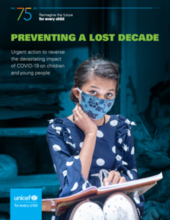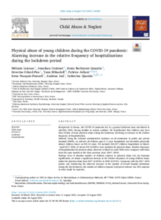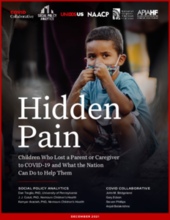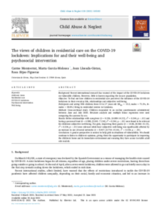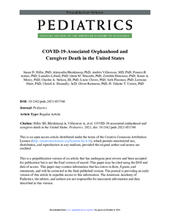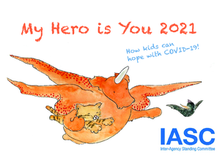This section includes resources on the response to the COVID-19 pandemic as it relates to child protection and children's care.
News on COVID-19 and Children's Care
Webinars and Events on COVID-19 Response
Displaying 61 - 70 of 750
As UNICEF commemorates its 75th year, this report lays out the work in front of us by taking stock of the ongoing impact of COVID-19 on children and the road to respond and recover to reimagine the future for every child.
In France, the COVID-19 pandemic led to a general lockdown from mid-March to mid-May 2020, forcing families to remain confined. This study found a significant increase in the relative frequency of young children hospitalized for physical abuse from 2017 (0.053%) to 2020 (0.073%).
Among the more than 760,000 deaths from COVID-19 in the United States are parents, custodial grandparents, or other caregivers on whom children had relied for financial, emotional, and developmental support. Many of these children already faced significant social and economic adversity, and these devastating losses can impact their development and success for the rest of their lives. This report estimates the number of children who lost a parent or other caregiver to COVID-19 and provides concrete recommendations for urgent actions to protect these vulnerable children and their remaining caregivers.
Recent international research has warned of the impact of the COVID-19 lockdown on vulnerable children. However, little is known regarding the in-care population. The objective of this study was to find out how children in residential care perceived the influence of the COVID-19 lockdown in their everyday life, relationships and subjective well-being. Participants and setting: 856 children from 10 to 17 years old (Mage = 15.5, males = 71.2%, females = 28.8%) living in residential centres in Catalonia.
This panel discussed coronavirus-associated caregiver loss and the work being done by the international community, the U.S. government, and faith-based actors to support vulnerable children and turn the tide toward better care. It was moderated by Gillian Huebner, executive director of the Georgetown University Collaborative on Global Children’s Issues.
This webinar, the sixth in the Transforming Children's Care Webinar Series, provided an introduction to trauma-informed care from various perspectives and vantage points.
This report captures overall and U.S. state-specific findings, disaggregated by race/ethnicity, for COVID-19-associated orphanhood and death of grandparent caregivers. High rates of orphanhood, marked disparities, and state-specific differences show the overlooked burden among children at greatest risk, in states most affected.
The COVID-19 pandemic is destined to leave millions more children without family caregivers. Increases in mortality of parents and other caregivers in the COVID-19 pandemic are accompanied by increases in extreme vulnerability from loss of livelihoods, schooling, health recovery and usual sources of service provision and support. This webinar aims to bring an understanding of how COVID-19 will affect the lives of children, how lessons learned from prior emergencies can be adapted, and how an understanding of complex adversities can maximize the effectiveness of our response.
The book aims to help children stay hopeful and positive during the COVID-19 pandemic. The story is a sequel to ‘My Hero is You: how kids can fight COVID-19!’, published in April 2020.
Both books have been released by a collaboration of 60 organizations working in the humanitarian sector, including the World Health Organization, UNICEF, the United Nations High Commissioner for Refugees, the International Federation of Red Cross and Red Crescent Societies and the MHPSS Collaborative for Children & Families in Adversity.
The strengths-based assessment tool serves to both prevent family breakdowns and reintegrate children from institutions back into families (or other family-based or alternative care options). This article provides an overview of the tool, including its purpose, set-up and functionality within a case management system.

